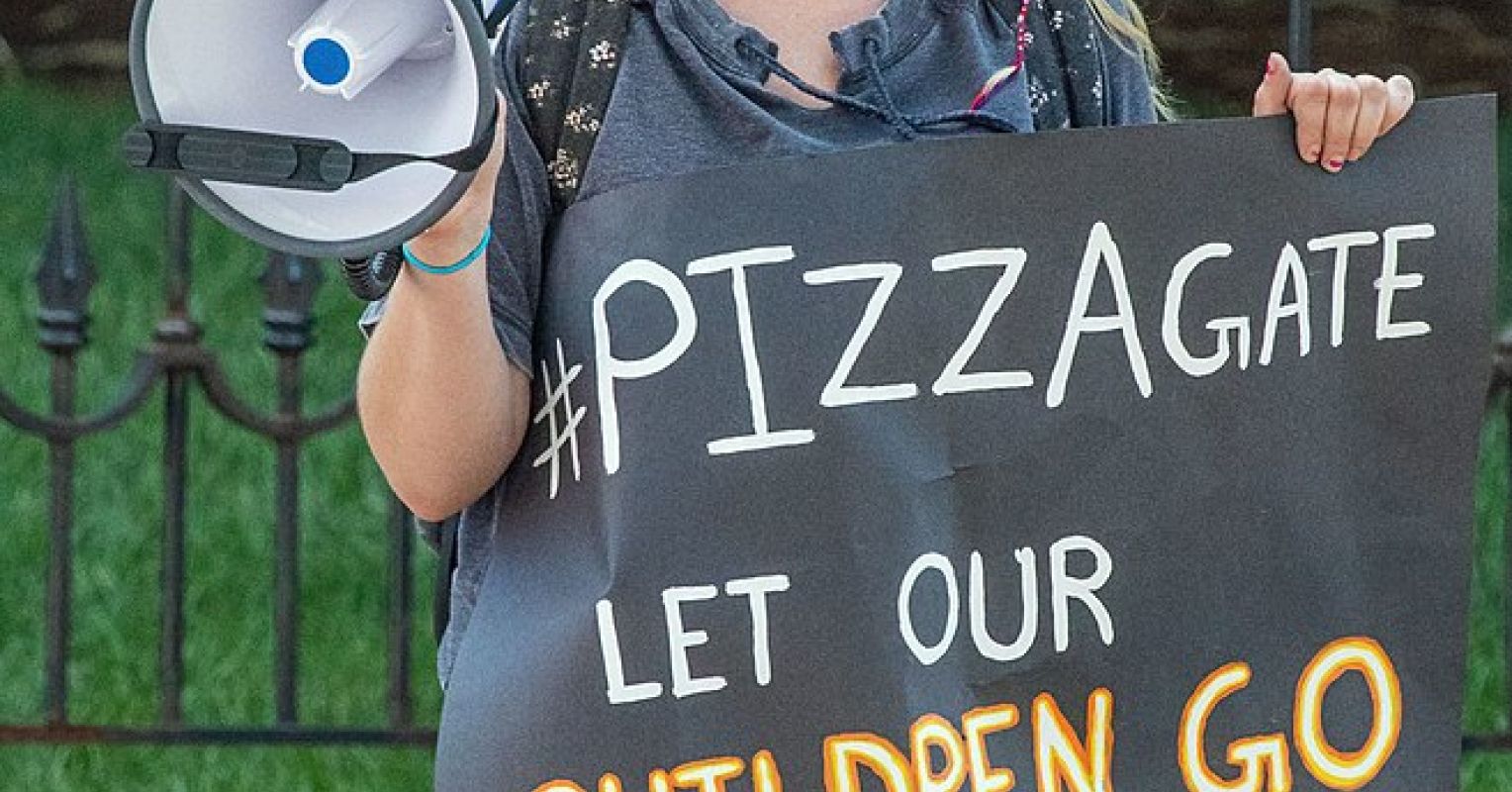Conspiracy beliefs: entertainment value and evil perceptions

Pizzagate protester
Source: Becker1999 / Wikimedia Commons, Creative Commons Attribution 2.0 Generic License
Why do people believe in conspiracy theories? This question is currently of great interest in psychological research. Research focuses primarily on the differences between people that may lead them to believe in conspiracy theories or not. Less research focuses on the components of conspiracy theories that might make them credible.
Consider the entertainment value
One article suggested that “one reason people believe in conspiracy theories is because they find them entertaining” (van Prooijen et al., 2022). In one study, participants read an essay about Jeffrey Epstein, a wealthy convicted sex offender. The essay either said he was murdered in prison or committed suicide. The murder version was rated as more entertaining (i.e., more engaging, more entertaining) than the suicide version. More importantly, the murder version led participants to have more conspiracy beliefs about this incident than the suicide version. Moreover, the more the conspiracy essay increased perceptions of entertainment value, the more conspiracy beliefs increased. This is called statistical mediation. In another study, participants read an essay about a political election in a fictional country, described in an antagonistic or civilized way. The more antagonistic election essay was rated as more entertaining and led to more conspiracy beliefs than the civilized election essay. Entertainment did not statistically mediate conspiracy beliefs in this study. The authors interpreted these results to mean that people believe in conspiracies because they are entertaining. This research article has attracted a lot of attention.
Kinga Szymaniak, Dominic Edgeworth, Gabriel Sebban, Cindy Harmon-Jones, and I (Harmon-Jones et al., 2024) felt that this research stands out from many other studies of conspiracy beliefs in that it examines aspects of the message that may contribute to conspiracy beliefs. We replicated the design of this research and examined another possible factor that may contribute to conspiracy beliefs.
Consider bad perceptions
“Conspiracy theories refer to causal explanations of events that attribute blame to a group of powerful individuals (the conspirators) who are secretly plotting clandestine plans that benefit themselves and harm the common good” (Bowes, Costello, & Tasimi, 2023). Conspiracy theory belief differs from other types of belief because it involves (1) powerful groups of individuals (2) secretly working together to (3) act evilly and harm others. We focused on the last component, the perception that others are acting evilly. We predicted that individuals confronted with information suggesting that powerful individuals are secretly working together will be more likely to assume that something evil is happening and then more likely to believe in the conspiracy.
In our research, participants read essays about Epstein in one study and essays about the political elections in a fictional country in two studies. The first study found that Epstein’s murder increased conspiracy beliefs, entertainment value, and perceptions of evil compared to Epstein’s suicide. The second and third studies found that the antagonistic elections increased conspiracy beliefs, entertainment value, and perceptions of evil compared to the civil elections.
We also examined statistical mediation, which tests whether entertainment value and/or perceptions of evil “explain” the effect of essay type on conspiracy beliefs. Perceptions of evil mediated the effect of essay type on conspiracy beliefs. That is, the more participants perceived the essay to reflect evil intentions on the part of the actors, the more likely they were to believe in a conspiracy. However, entertainment value was not a mediator.
On the failure to reproduce entertainment value as a mediator
The failure to reproduce the mediation effects found by van Prooijen et al. (2022) was surprising. The samples and methods used were similar to those used previously. However, we modified the texts by removing one sentence from each essay in the Epstein study (the one with mediation evidence). From the low conspiracy theory condition, we eliminated the sentence “There is little reason to question the official interpretation of this event.” From the high conspiracy theory condition, we eliminated the sentence “There is, however, sufficient reason to question the official interpretation of this event.” We eliminated these sentences because they could create a desire in an experimenter to believe/disbelieve the information (Orne, 1962). Individuals in the high conspiracy theory condition who were more influenced by the experimenter’s demand to believe the conspiracy more strongly may also have been more likely to rate the information as more entertaining.
Was the logic behind the hypothesis of the previous research flawed? The logic was that potentially conspiracy-theoretical information leads to people perceiving it as entertaining, and these perceptions then lead to conspiracy beliefs.
Remember Pizzagate? That was a conspiracy theory that spread rapidly and widely in 2016. It claimed that a pedophile ring involving members of the Democratic Party was operating out of a Washington, DC pizzeria. It included many other fascinating details involving blood and red shoes, but had no basis in fact. When I first learned about this conspiracy, I found it entertaining, but those feelings did not lead me to believe this information. I simply laughed at the theory and how ridiculous it was.
In the fictional election study by van Prooijen et al. (2022), entertainment value was manipulated with two election essay conditions (antagonistic and civil). However, as our research found, this manipulation also influenced the perception of bad intentions. Thus, the manipulation triggered additional psychological processes that may have been key to the increase in conspiracy beliefs.
Important reading on conspiracy theories
Diploma
Like some conspiracy theories, some findings from psychological research spread far and wide and are believed to be true. A closer look at the methods used to obtain the results and the logic underlying the hypotheses may reveal that these results and their interpretation are incorrect. It is up to researchers and readers to critically evaluate all information.
References
Bowes, SM, Costello, TH, & Tasimi, A. (2023). The conspiracy-theoretical mind: A meta-analytic examination of motivational and personological correlates. Psychological Bulletin, 149(5–6), 259–293. https://doi.org/10.1037/bul0000392
Frey, D. (1986). Recent research on selective information gathering. In L. Berkowitz (ed.), Advances in experimental social psychology (Vol. 19, pp. 41–80). Academic Press. https://doi.org/10.1016/S0065-2601(08)60212-9
Harmon-Jones, E., Szymaniak, K., Edgeworth, D., Sebban, G., & Harmon-Jones, C. (2024). Evil perceptions, but not ratings of entertainment value, are associated with conspiracy beliefs. Limits of social psychology, 2. https://doi.org/10.3389/frsps.2024.1350584
Orne, MT (1962). On the social psychology of the psychological experiment: With special emphasis on demand characteristics and their implications. American psychologist, 17776–783.



